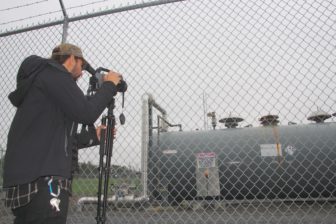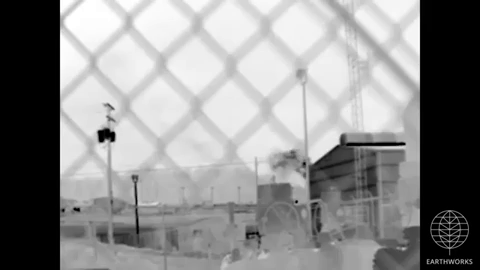You may well know, Pennsylvania readers, that you are a part-owner of the stunning Pine Creek Gorge (known as the state’s “Grand Canyon”) and its diverse and verdant watershed. But the oil and gas industry’s free rein in these lush public lands – including degrading our already underfunded, ill-maintained state parks and forests – belies your claim to them. A recent tour of the area by FracTracker, Earthworks’ Community Empowerment Project, and other groups and concerned individuals documented disturbing evidence that these lands have in truth been turned over to the new, private owners for their own profit.

In a coordinated endeavor, FracTracker gathered expertise from around the state and beyond to conduct a two-day survey of the impacts of gas development in the Pine Creek Watershed. They invited the Earthworks team to deploy our specialized, industry-standard optical gas imaging (OGI) camera that allows us to visually record evidence of normally invisible air pollution.
The Pine Creek Watershed spans 981 square miles and includes all or part of 42 municipalities. We were able to get close enough to document air pollution at eleven sites, including wells and compressor stations. Some of the emissions are dramatic – massive and unrelenting plumes that travel well beyond the fenceline and into the surrounding forest. Some are more insidious, like the steady stream of gas quietly but continuously venting from rusted tank hatches.

With this powerful visual evidence in hand, we filed formal complaints with the Department of Environmental Protection (DEP) on some sites, and reached out directly to EQT, the
operator of two others. DEP responded to our complaints with a site inspection, but stated that they “found no issues or violations.” EQT acknowledged the emissions we documented, but asserted that the level of pollution is permitted by the state. In other words, EQT asserts that wasting natural gas– a resource that the public theoretically should own when it’s on state land–is perfectly acceptable. Nor does EQT have any basis for the assumption that the pollution levels we documented are within levels allowed by the state.
These lax rules allow methane — the primary component of natural gas — to wreak havoc on our climate. In addition, dangerous co-pollutants add to our ground-level ozone problem and can have widespread health impacts.
The team effort to document the impacts of this industry in the Pine Creek Watershed was undoubtedly extensive. Even so, our group could only cover enough ground in a few days to witness a small portion of the gas industry’s reach in this watershed. Research tells us that 1/5th of the US greenhouse gas emissions come from federal public lands alone. How much more are we allowing our state forests, game lands, and parks to add to the problem, in Pennsylvania and many other places?
Weak pollution control rules favor oil and gas companies and allow them to waste resources, pollute our air, and damage the climate. This continued exploitation of our public lands diminishes the value of this common good. Please join Earthworks in calling on Governor Wolf and the DEP to end to further gas development on public lands, and to finalize strong rules to reduce pollution from gas industry–and thereby help protect the resources that belong to all of us.
For more information:
